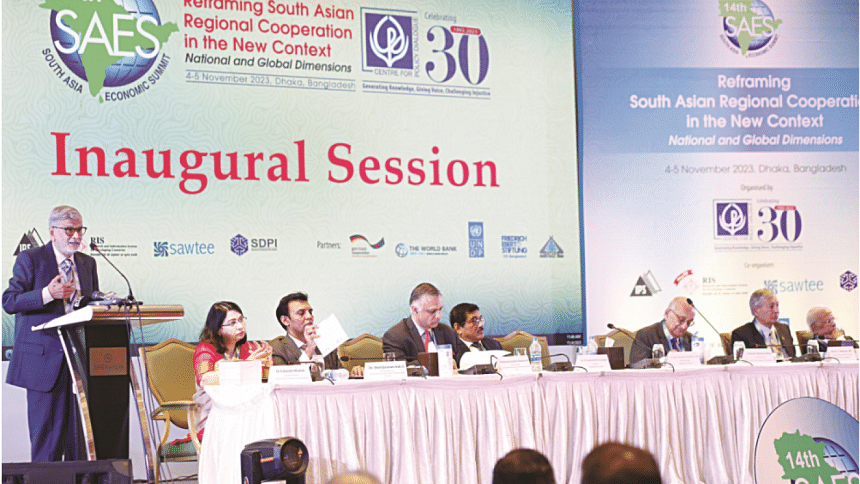Political consensus key to boosting South Asia’s integration

Political consensus is necessary among the leaders in South Asian countries to deepen integration, enhance trade, beef up cooperation in their fighting against climate change, and achieve much-desired economic prosperity, said economists, researchers and policy-makers yesterday.
Three countries -- Bangladesh, Nepal and Bhutan – are graduating from the group of the least-developed countries (LDCs) in the coming years, so regional integration is vital, they said.
They made the comments while speaking at the inaugural session of the two-day 14th South Asia Economic Summit at the Sheraton Dhaka hotel.
"A continuous effort is necessary from political leaders of South Asian countries to boost regional integration," Planning Minister MA Mannan said.
He spoke at the inaugural session of the summit titled -- Reframing South Asian Regional Cooperation in the New Context National and Global Dimensions. The Centre for Policy Dialogue (CPD) organised the two-day event.
The minister said there are the Saarc (South Asian Association for Regional Cooperation), the BBIN (Bangladesh, Bhutan, India, Nepal) Initiative, the Sasec (South Asia Subregional Economic Cooperation) and the BIMSTEC (Bay of Bengal Initiative for Multi-Sectoral Technical and Economic Cooperation).
"But they are all sleeping. To make them functional, the leaders of the countries should work together and it is in the hands of the leaders."
He said though there is a huge potential for higher regional trade, it is still at a very low level due, maybe, to distrust, tariff and non-tariff barriers.
Citing the data of the Bangladesh Institute of Development Studies, Mannan said 8 percent of global trade is been taking place among South Asian countries.
Weak infrastructure is a major barrier to raising regional trade, so Bangladesh has invested a huge amount in developing road, rail and waterway network, he added.
Intra-regional trade among Saarc countries was about $40 billion in 2022, way higher than $6 billion in 2003.
Imports among Saarc countries were around 4 percent of the total imports from the world by the nations. Exports were about 7 percent of their total shipment to the world.
"This indicates that despite steady growth in regional trade, it is still limited compared to the total trade of the region," said Nandalal Weerasinghe, governor of the central bank of Sri Lanka.
"Intra-regional trade among Saarc nations is crucial for promoting economic growth and reducing poverty in the region."
Trade within the region has historically been limited due to various factors, including political tensions, restrictive tariffs and duties, import restraints, protracted customs requirements, and excessive documentation.
A welcome initiative has been the recent scheme by New Delhi to settle trade transactions in the Indian rupee, Weerasinghe said.
"This is expected to create more avenues for trade and trade integration within the region by reducing the exposure to the US dollar and other reserve currencies."
"It may also be appropriate to assess the possibility of expanding such initiatives to the South Asia region as a whole and expand trade settlement by South Asian countries in local currencies."
Many South Asian countries were trying to recover from the shock of the pandemic when the Ukraine war erupted, deepening the struggle of the countries, said Shirin Sharmin Chaudhury, speaker of parliament.
"Regional integration can help them significantly."
Prof Rehman Sobhan, founding chairman of the CPD, said economic advancement is being driven mostly by bilateral trade with the West, instead of South Asia or multilateral trade.
"Civil societies should identify in which way and where regional cooperation can take place."
The noted economist suggested establishing an institute to go through all the issues that were itemised from the very beginning of the Summit of civil societies.
"It will summarise the agendas, progress, how the issues changed and where we stand together. The institute also will do advocacy to implement the agendas."
The South Asian countries are facing three problems, namely Covid-19, conflict between many countries in the global arena, and climate change, said Abid Qaiyum Suleri, executive director of the Sustainable Development Policy Institute of Pakistan.
"These issues are affecting food security, energy security, and economic prosperity of the countries. So, we have to think together to protect ourselves."
Prof Sachin Chaturvedi, director-general of the Research and Information System for Developing Countries of India, said South Asian countries are making huge contributions to global economic growth, but the regional trade among themselves is still at a lower level.
"Researchers should find ways to translate the potential of the region into reality."
Fahmida Khatun, executive director of the CPD, said the prospect of smooth graduation for Bangladesh, Nepal and Bhutan from the LDC group has become more challenging in the new economic reality.
"In this context, cooperation among the countries in South Asia is crucial."
She said regional cooperation has stumbled over the years due to political tensions, historical animosity between countries, and ongoing political and territorial disputes.
"There prevails a trust deficit among countries in the region."
According to her, the new areas of cooperation may include the public health system, structured labour market policies, expansion and deepening of supply chains, and foreign direct investments
Civil societies have been talking about regional cooperation for the last three decades, but it is still not up to the mark, said Durga Prasad Bhattarai, a former foreign secretary of Nepal.
He recommended setting aside political differences for the betterment of the economic benefit of the region.
"You can't change your neighbours, so it is better to accelerate integration."
Bhattarai pointed out that countries have been talking about food security for years, but in reality, they are imposing restrictions on the movement of food.
"We have to work collectively to ensure food security in the whole region."
Dushni Weerakoon, executive director of the Institute of Policy Studies of Sri Lanka, Paras Kharel, executive director of the South Asia Watch on Trade, Economics and Environment of Nepal, and Ishrat Husain, a former governor of the State Bank of Pakistan, also spoke.

 For all latest news, follow The Daily Star's Google News channel.
For all latest news, follow The Daily Star's Google News channel. 



Comments